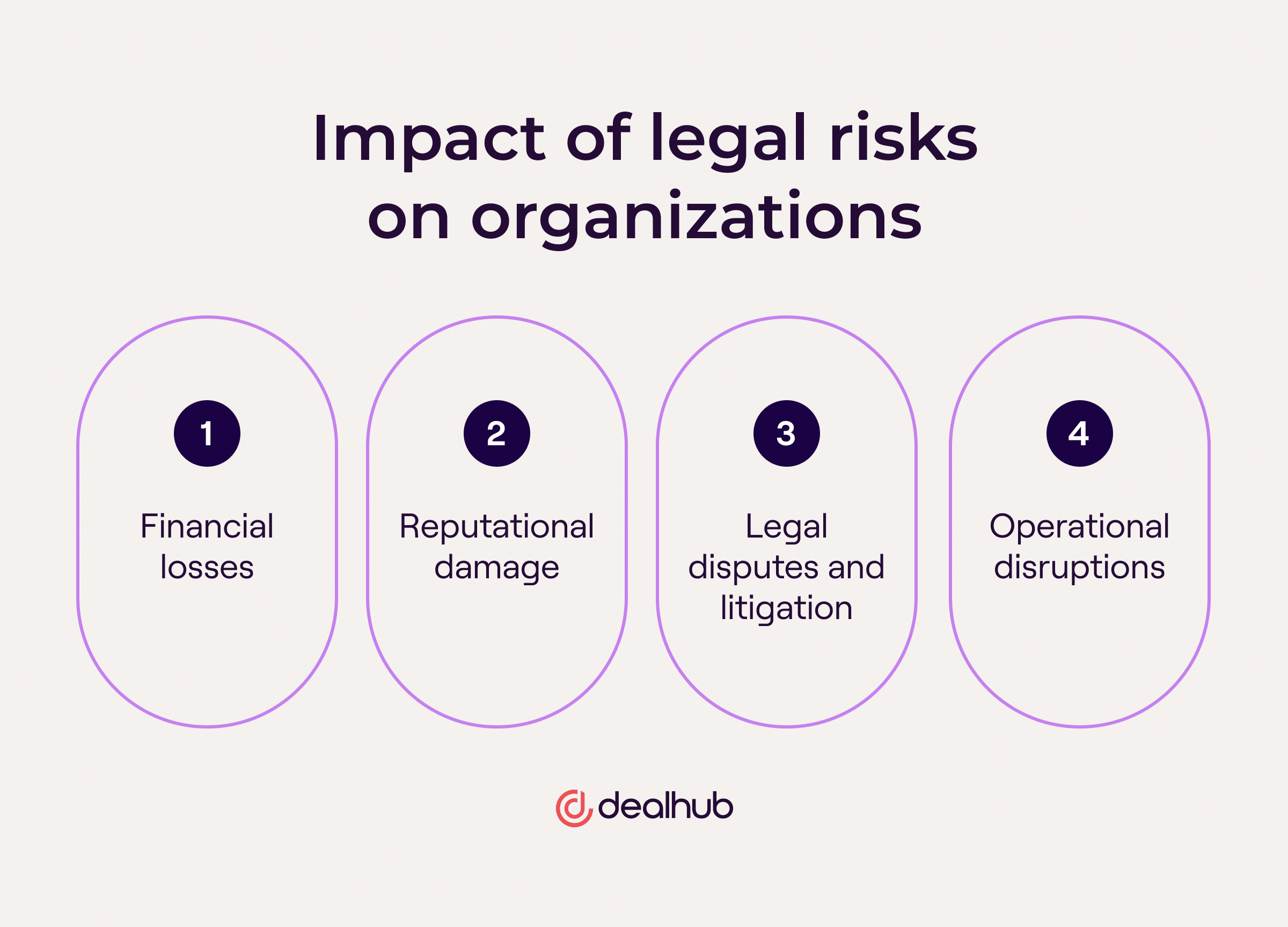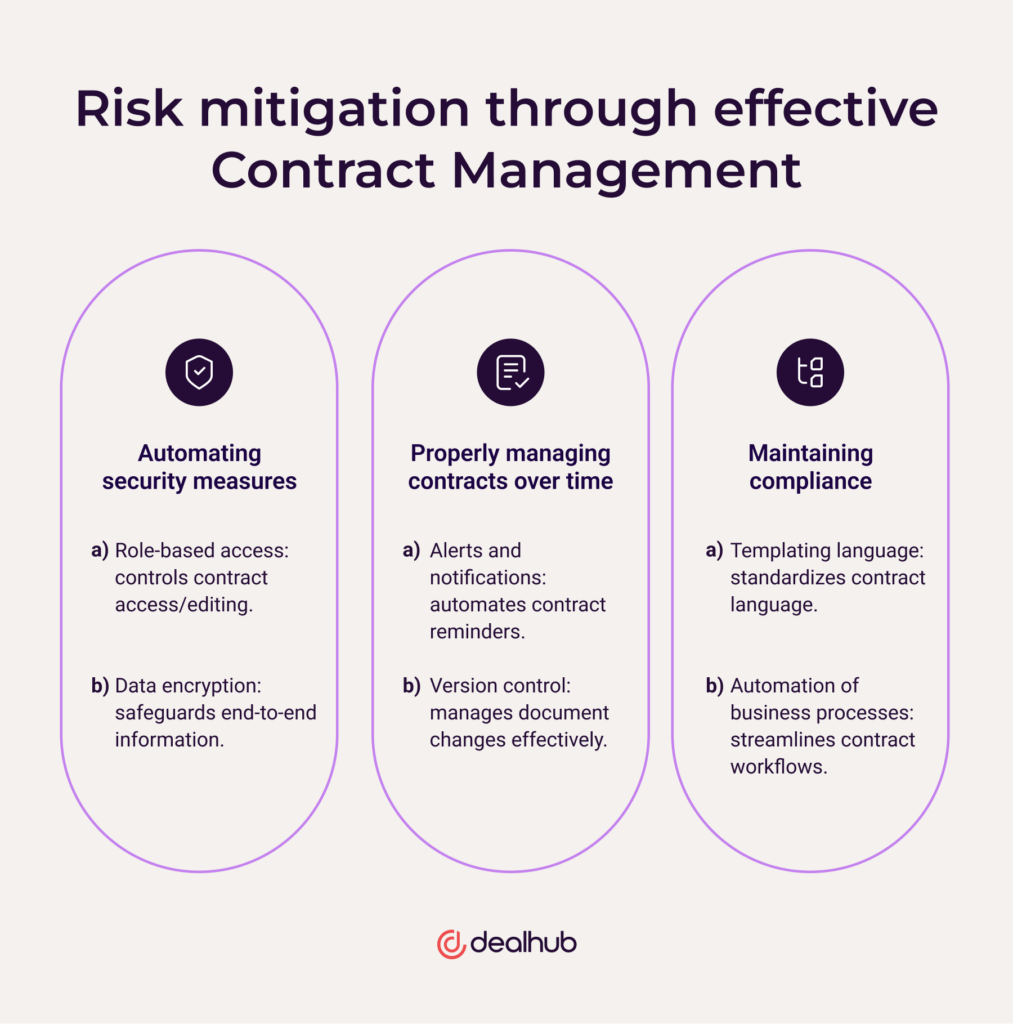This is why forward-thinking organizations rely on robust contract management software to circumvent these potential pitfalls, guaranteeing contract compliance, transparency, and efficiency.
In this discussion, we will delve into the critical role of contract management in safeguarding your business from legal hazards. Furthermore, we’ll explore how the use of automated and efficient contract management solutions can prove to be an invaluable partner in this process. Let’s dive in!
It’s not worth the risk
When it comes to legal risks, the adage “better safe than sorry” couldn’t be more true. No company wants to deal with the ramifications of being subpoenaed. Even short of direct legal action, failing to manage contracts effectively can open the floodgates to a host of potential pitfalls, including losing clients, losing money, affecting company morale, and damaging brand trust. So, before we explore solutions, let’s break down the types of risks in contract management and the possible consequences an organization exposes itself to if it doesn’t take the proper measures.
Beware of common legal risks in business contracts
As the global regulatory landscape continues to grow in complexity, non-compliance with laws and regulations remains a grave concern for a company’s legal department. There are, however, common legal risks that companies need to be aware of and work to actively avoid. Types of risks in contract management include:
- Non-compliance with laws and regulations. Failing to comply with industry-specific regulations, local laws, or governmental requirements can have serious consequences. Non-compliance may lead to:
- Sizable fines
- Revocation of licensing/loss of permits
- Criminal charges
- Breach of contract. Breach of contract is triggered when one party fails to fulfill its obligations as specified in the agreement. Typical contract breaches include:
- Failure to deliver goods or services
- Non-payment
- Violating specific terms and conditions
- Unclear or incomplete terms and conditions. Contracts that contain vague language run the risk of creating confusion and ambiguity. Disagreements can easily arise over the interpretation of contract terms which can spiral into larger disputes or more serious legal battles.
- Failure to meet contractual obligations. Either party failing to fulfill its obligations as specified in a legal contract will affect a company’s bottom line. Obligations vary and contractual failures may lead to:
- Delays in project/product delivery
- Non-performance
- Low-quality deliverables
- Sub-standard services
Impact of legal risks on organizations
The risks associated with poor contract management can be severe and far-reaching, affecting both the bottom line and the overall well-being of your business. When contracts are not carefully managed, companies may face:

- Financial losses. Financial losses from poor contract management manifest as penalties, fines, damages, or settlement costs. These expenses can significantly impact a company, potentially reducing profitability, causing cash flow issues, and hindering future growth opportunities.
- Reputational damage. Legal risks and disputes can damage a company’s reputation and erode trust among stakeholders, partners, and customers. When it comes to business, negative publicity, media coverage, or online reviews can damage a brand image, resulting in a loss of customers, reduced market share, and diminished competitive advantage.
- Legal disputes and litigation. Contract disagreements can easily escalate into expensive, time-consuming legal battles. Lawsuits, arbitration, or mediation proceedings can drain valuable resources, diverting time, money, and energy from core business activities. These can also disrupt operations, strain employee morale, and negatively impact productivity.
- Operational disruptions. Legal risks cause significant disruptions to business operations. Whether it’s dealing with regulatory investigations, contractual disputes, or non-compliance issues, organizations may face distractions and increased administrative burdens. Attention and expenses diverted from core activities can impede growth and progress.
The impact of legal risks in poor contract management can be devastating, especially for small and medium-sized enterprises that operate on tight budgets and may not have the means to bounce back.
All of this is entirely avoidable when the right processes are in place to manage contracts and maintain regulatory compliance.
Mitigating risk with proper Contract Management processes
Companies that put the proper contract processes in place can remove much of the risk surrounding agreement structuring. Finding ways to streamline and standardize are integral to lowering the likelihood that essential aspects of a contract may be overlooked.

Automating security measures
- Adding role-based security to gatekeep who can access contracts. Companies that adopt solutions that allow role-based access can ensure only those with standing read or write documentation or agreement types while denying access to those who shouldn’t be able to view or edit. This prevents proprietary information or sensitive data from falling into the wrong hands.
- Leverage encryption to protect data. If a company is concerned with unauthorized access, it can also add data encryption to protect information end-to-end.
Properly managing contracts over time
- Use of alerts and notifications. Contracts handled manually run the risk of missing renewals, milestones, or dates integral to written agreements. With a trusted contract management process, it’s easy to automate these items so that the correct people get alerts, are assigned tasks, or have calendar reminders so that nothing slips through the cracks.
- Version control. When multiple parties are redlining the same document, tracking changes is critical to make reviewing and approving changes more manageable. Version control helps all parties avoid missing items, duplicating information, or entering inaccurate information into the copy.
Maintaining compliance across every process
- Templating language. Non-compliance can derail agreements when there is improper language in contracts. Avoiding this is as easy as having a library of templates that contain wording already preapproved by an organization’s legal team.
- Automation of business processes. When combined with template libraries, contract workflows help ensure no details are missed during negotiation and approvals. These workflows also provide a paper trail for organizations during auditing processes.
- E-signature approvals. Another way to authenticate contracts and maintain seamless audit trails is to incorporate e-signature technology into your contract management process. E-signatures are tamper-proof, make collecting signatures seamless, and become one single source of truth for all parties.
Modern contract management software combines all these powerful elements under one umbrella to ensure contract creation, maintenance, and renewals are seamless, transparent, and straightforward for all parties.
Contract Management software: safeguarding your business from legal pitfalls
Contract management software has the potential to be game-changing – especially for teams that handle contracts and compliance manually. Leveraging future-forward technological solutions to contract management benefits businesses as they can streamline their contract processes, mitigate legal risks, and gain a competitive edge.
How is that possible? Through the right balance of automation, transparency, and integrations. Here, for example, are three key features and benefits of contract management software that shield your business from legal pitfalls:
Streamline contract creation and approvals
Businesses no longer need large staff pools to sift through piles of paper contracts or navigate a sea of email attachments. Contract management software provides a centralized contract repository. This central repository allows teams to easily store, organize, and retrieve contracts. With automated workflows and contract drafting, sales teams can save time and ensure accuracy (without each contract needing legal review) by leveraging pre-approved templates and clauses. Having approval workflows and electronic signatures like eSign also streamlines the contract approval process, eliminating bottlenecks and reducing the risk of delays or missed deadlines.
Enhance contract visibility and tracking
With contract management software, companies gain complete control over each contract from creation to expiration. Document version control ensures the right people can always access the latest contract revisions. This helps teams avoid confusion or reliance on outdated terms. Real-time contract tracking and reporting also provide visibility into the status of contracts, key contract milestones, and essential deadlines. Through alerts and notifications, you can stay on top of critical contract events, such as renewal dates or termination clauses, ensuring you never miss an essential obligation.
Ensure compliance with laws and regulations
Think of contract management software as an on-demand legal expert that excels at navigating the complex web of laws and regulations. By integrating legal requirements into contract templates, you can rest assured that your agreements are compliant from the start. Automated compliance checks identify any deviations or non-compliance issues in real time, allowing you to take corrective action promptly. With regulatory reporting capabilities, you can generate comprehensive reports demonstrating adherence to industry standards or governmental regulations. This not only provides peace of mind – it also creates a new level of transparency and reduces legal exposure.
Unlocking efficiency, compliance, and peace of mind with Contract Management solutions
To avoid potential legal woes, consistency is critical, and the best way to standardize contract management (while reducing the introduction of human error), is to automate the process altogether via investment in a digital contract management solution. Automation improves efficiency and accuracy and ensures contracts are completed correctly so that no information is ever missing (which is integral from a compliance perspective). Contract management solutions also help sales teams navigate contracts without having to be legal experts themselves.
Of course, the most compelling case for contract management software adoption is that it significantly reduces the likelihood of contract disputes and litigation. A company will create a solid foundation for smooth and transparent business dealings by centralizing contract processes, streamlining approvals, and maintaining compliance. It saves time in the short term by simplifying contracting processes and removing bottlenecks that can frustrate clients. In the long-term, it avoids future time-consuming and costly legal battles and broken trust between the company and its clients.
The benefits of contract management software time and cost savings are undeniable. With streamlined contract creation, approvals, and contract renewals, you can accelerate your contract life cycle, allowing you to focus on core business activities. Integration with CPQ (Configure Price Quote), Billing, and Revenue Recognition Software optimizes the renewal process, ensuring revenue recognition compliance, and preventing revenue leakage, boosting overall financial health.
Final thoughts
In today’s legal landscape, safeguarding your business from legal risks should be a top priority. Contract management software emerges as a necessary tool for organizations looking to protect their interests, ensure compliance, foster growth, and align goals. When streamlining contract creation and approvals, enhancing visibility and tracking, and enabling compliance with laws and regulations, contract automation solutions provide a solid shield against legal pitfalls. Contract lifecycle management benefits unlock efficiency, compliance, and security, allowing teams to focus on what they do best – nurturing clients and building toward future growth. Take charge of your contracts and shield your business from unnecessary legal risks with the power of contract management software.



